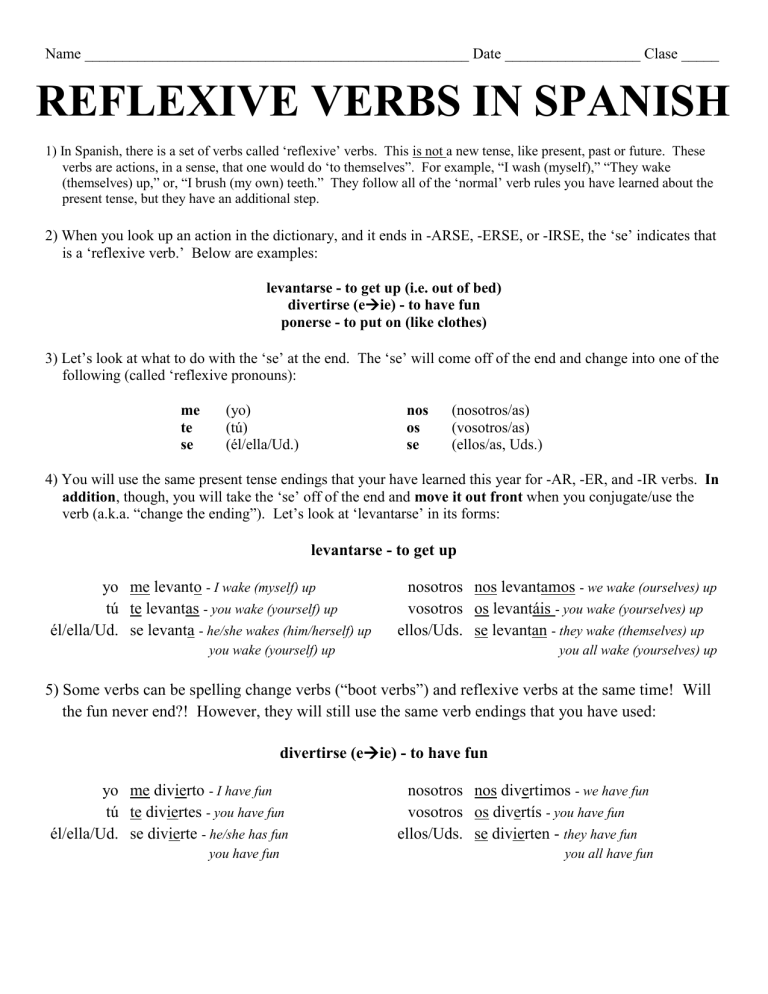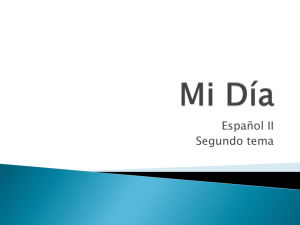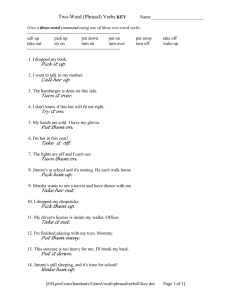
Name ___________________________________________________ Date __________________ Clase _____ REFLEXIVE VERBS IN SPANISH 1) In Spanish, there is a set of verbs called ‘reflexive’ verbs. This is not a new tense, like present, past or future. These verbs are actions, in a sense, that one would do ‘to themselves”. For example, “I wash (myself),” “They wake (themselves) up,” or, “I brush (my own) teeth.” They follow all of the ‘normal’ verb rules you have learned about the present tense, but they have an additional step. 2) When you look up an action in the dictionary, and it ends in -ARSE, -ERSE, or -IRSE, the ‘se’ indicates that is a ‘reflexive verb.’ Below are examples: levantarse - to get up (i.e. out of bed) divertirse (eie) - to have fun ponerse - to put on (like clothes) 3) Let’s look at what to do with the ‘se’ at the end. The ‘se’ will come off of the end and change into one of the following (called ‘reflexive pronouns): me te se (yo) (tú) (él/ella/Ud.) nos os se (nosotros/as) (vosotros/as) (ellos/as, Uds.) 4) You will use the same present tense endings that your have learned this year for -AR, -ER, and -IR verbs. In addition, though, you will take the ‘se’ off of the end and move it out front when you conjugate/use the verb (a.k.a. “change the ending”). Let’s look at ‘levantarse’ in its forms: levantarse - to get up yo me levanto - I wake (myself) up tú te levantas - you wake (yourself) up él/ella/Ud. se levanta - he/she wakes (him/herself) up nosotros nos levantamos - we wake (ourselves) up vosotros os levantáis - you wake (yourselves) up ellos/Uds. se levantan - they wake (themselves) up you wake (yourself) up you all wake (yourselves) up 5) Some verbs can be spelling change verbs (“boot verbs”) and reflexive verbs at the same time! Will the fun never end?! However, they will still use the same verb endings that you have used: divertirse (eie) - to have fun yo me divierto - I have fun tú te diviertes - you have fun él/ella/Ud. se divierte - he/she has fun you have fun nosotros nos divertimos - we have fun vosotros os divertís - you have fun ellos/Uds. se divierten - they have fun you all have fun 6) Here is a list of other common reflexive verbs in Spanish: levantarse - to get up despertarse (eie) - to wake up cepillarse los dientes - to brush your teeth vestirse (ei) - to get dressed / to dress peinarse - to comb your hair afeitarse - to shave acostarse (oue) - to go to bed ducharse - to take a shower / to shower lavarse - to wash (yourself) bañarse - to bathe dormirse - to go to sleep / fall asleep irse - to go away/leave maquillarse - to put on makeup sentarse (eie) - to sit down ponerse* - to put on (clothes) quitarse - to take off sentirse (eie) - to feel (an emotion) * - the ‘yo’ form of ‘poner’ is ‘pongo’. The remaining forms follow ‘normal’ rules. 7) Using the words from above, try writing some of your own ideas below:

